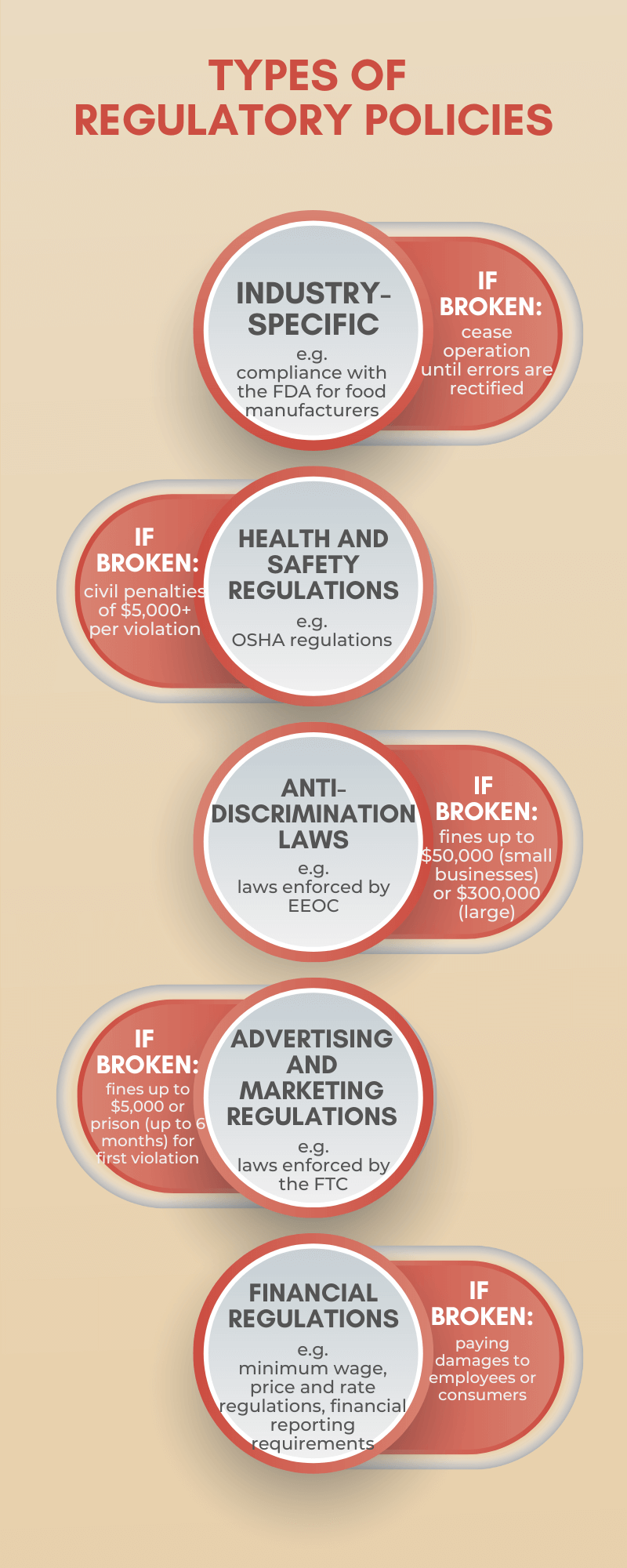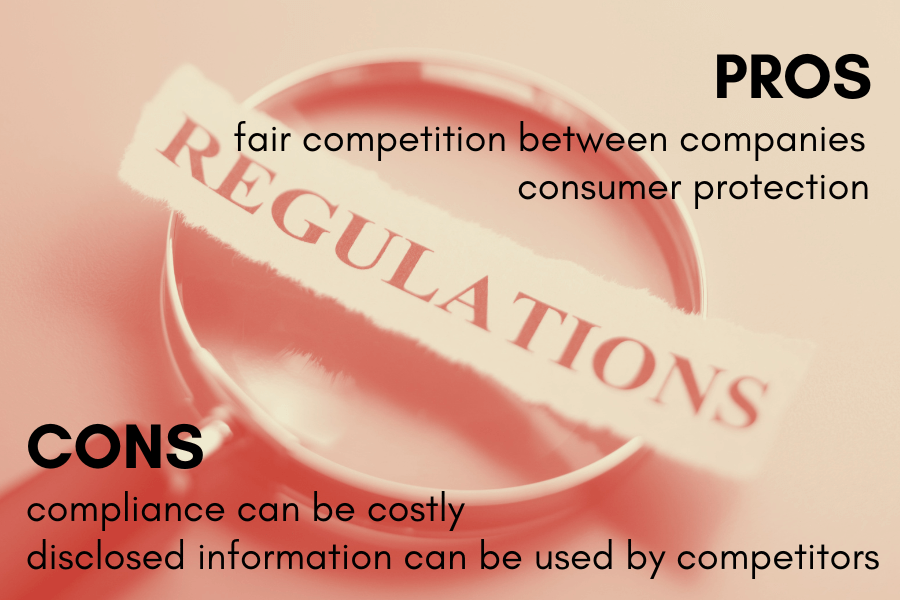Key Takeaways
- State and federal regulations are designed to protect the public, employees, and the environment from danger.
- Businesses can be subject to criminal or civil penalties if they don’t comply with regulations – they may face fines, damages, or even be forced to shut down.
- It can be costly for small businesses to follow all the regulations, but it’s necessary to protect consumers and ensure fair competition.
What Are the Reasons for Government Regulation of Business?
What happens if regulatory policies for a business are violated is an important question, as government regulation exists for a reason.
Protecting the Public
Regulations protect the public from harmful or dangerous products and services. For example, the Food and Drug Administration government agency (FDA) regulates food and drugs to ensure they’re safe for human consumption. Similarly, the Federal Trade Commission (FTC) audits advertising to prevent false or misleading claims about products or business practices.
Protecting Employees
Another reason is to protect employees from unsafe working conditions. The Occupational Safety and Health Administration (OSHA) enforces safety standards in workplaces to reduce injuries, illnesses, and fatalities. The OSHA also requires that employers provide safety training for employees and record all workplace accidents and injuries.
Protecting the Environment
Finally, businesses are regulated so that they don’t pollute the environment. The Environmental Protection Agency (EPA) enforces environmental laws such as the Clean Air Act and the Clean Water Act. These laws set limits on emissions from factories and power plants, force businesses to dispose of hazardous waste properly, and establish guidelines for cleaning up contaminated sites.
Here are more examples of regulations that businesses must comply with. You can find the details of what applies to you on your local and state government websites.
Types of Government Business Regulations

Before answering what happens if regulatory policies for a business are violated, it’s vital to understand what exactly business owners need to adhere to. You could run into trouble if you fail to comply with:
- industry-specific regulations, such as those for healthcare, finance, and transportation;
- health and safety regulations, including those related to food, drugs, workplace hazards, and environmental protection;
- anti-discrimination laws that protect employees and customers;
- advertising and marketing regulations;
- making payments in accordance with minimum wage laws;
- financial reporting requirements, including those for publicly traded companies.
Editor’s Note ✏️
Taxes are the best-known aspect of business regulation. Filing taxes is mandatory, and failing to do so can result in hefty fines. To stay ahead, you need to be aware of various tax obligations such as payroll and sales tax, income tax, or excise duty. Additionally, you must determine if any special permits are required for certain activities within your business operations.
So What Happens If Regulatory Policies for a Business Are Violated?
All businesses must comply with certain regulatory policies, such as antitrust laws. These laws help businesses – they ensure fair competition, without anyone monopolizing the market. If a business fails to implement government regulations, it can be punished with fines, jail time for the owners, or other sanctions. In some cases, the business may even be forced to sell off assets or close down entirely.
Does Government Regulation Help Small Businesses?
You know what happens if regulatory policies for a business are violated, but is it all worth it? Many small businesses struggle to keep up with laws and regulations because they simply can’t afford the resources required to comply. Disclosure requirements are burdensome, too, as entrepreneurs have to disclose sensitive information that could be used by their competitors. As a result, regulation often puts small businesses at a disadvantage.

However, government regulation is necessary to level the playing field and protect consumers. Its proponents argue that without policies and procedures, many businesses would take advantage of consumers, and there would be chaos on the market. Ultimately, the debate surrounding regulation is complex, and you’re entitled to your own opinion, but you must comply with the law anyway.
Frequently Asked Questions
What Are Some Possible Consequences of Violating Laws and Regulations?
Both criminal and civil penalties can apply, including fines, confiscation of illegally obtained goods, and suspension or revocation of business licenses. Additionally, businesses may be subject to expensive civil lawsuits.
How Does Regulation Affect Businesses?
Compliance with regulations can be costly for businesses, but it also helps to create a level playing field by ensuring that everyone follows the same rules. This can help to build trust in the marketplace and increase consumer confidence in their purchases. Furthermore, some regulations are intended to protect the environment or workers, making them all-around beneficial.
What Are the Consequences of Unethical Business Practices?
Loss of credibility, fines, and legal action are all possible outcomes of unethical business practices. Furthermore, a company’s reputation can be harmed, and its ability to attract new customers or investors can suffer.
What Are Regulatory Issues in Business?
Regulatory issues in business refer to rules and laws that organizations must follow in order to function legally. More specifically, when we say that a company has run into regulatory issues, it usually means that they’ve been contacted by an authority (such as the FDA) and given a deadline to make adjustments or risk severe fines.
Similar Posts:
- How Many Fire Extinguishers Are Required in a Business’s Premises: A Guide
- Pros and Cons of Owning a Bounce House Business (Inflatable Rental)
- How Much Does It Cost to Open a Liquor Store? Starting a Business
- How to Get a PO Box for a Business: Setting Up a Small Business Address
- How to File a Complaint Against a Business: Consumer Advice













